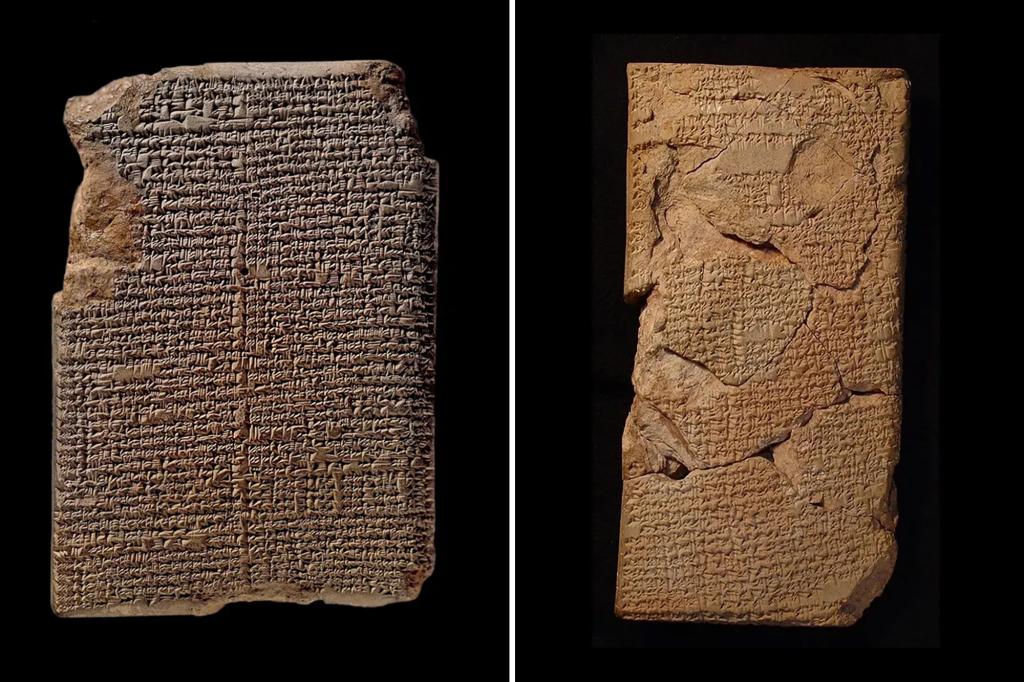Researchers finally deciphered a set of 4,000-year-old Babylonian tablets — and the messages aren’t about bright hopes for the future but are nearly all death, doom and gloom.
The four clay tablets that have cuneiform scrawled across them predict the deaths of kings and the downfalls of civilizations, according to a recent study published in the Journal of Cuneiform Studies.
The ancient artifacts were discovered more than 100 years ago in present-day Iraq and are a part of the British Museum’s collection but only now have been translated into modern language.
The fortune-telling from the peoples of southern Mesopotamia was based on the movement of the moon, specifically lunar eclipses — when the moon falls behind the Earth’s shadow.
They “represent the oldest examples of compendia of lunar-eclipse omens yet discovered,” the report authors Andrew George and Junko Taniguchi wrote.
The Babylonians analyzed the eclipses by time of night, movement of shadow, duration and dates which they then used to predict different happenings, according to the study.
They believed “events in the sky” were signs from gods warning about the futures of earth-bound peoples and rulers.
The omens inscribed on the tablets include “a king will die, destruction of Elam,” an area in Mesopotamia in what is now Iran, if “an eclipse becomes obscured from its center all at once [and] clear all at once.” Live Science reported.
Another predicts the “downfall of Subartu and Akkad,” two other regions of the time if “an eclipse begins in the south and then clears.”
Other concerning omens state “there will be an attack on the land by a locust swarm,” “there will be losses of cattle” and that “a large army will fall.”

Some of the omens may have been based on previously observed coincidences between the timing of different eclipses and major happenings, according to George, an emeritus professor of Babylonian at the University of London.
“The origins of some of the omens may have lain in actual experience — observation of portent followed by catastrophe,” he told Live Science.
Still, most were likely based on theories rather than real evidence.
The tablets likely originate from Sippar, an ancient Babylonian city southwest of what is now Baghdad, according to the professor.
They were used by advisers to the king to predict future happenings.
“Those who advised the king kept watch on the night sky and would match their observations with the academic corpus of celestial-omen texts,” the authors wrote in the study.
To get a second opinion on the likelihood of the omens happening, the advisers would study the entrails of sacrificed animals “to determine whether the king was in real danger,” according to the researchers.
They would also perform rituals to wade off the bad omen and prevent the predictions from happening, George and Taniguchi wrote.
Or the Babylonians would appoint a substitute king ahead of the forthcoming danger so that person would bear the brunt of the gods’ wrath — and eventually be killed — while the real king would remain unharmed, according to NASA.
The Babylonian astronomers became able to predict lunar eclipses with “a fair accuracy,” the space administration noted.
The finding comes on the heels of two ancient North American structures collapsing within just nine days of each other — a pyramid at the Ihuatzio Archaeological Zone in the Mexican state of Michoacán and the Double Arch in Utah.
But there’s a more supernatural explanation according to Purépecha tribe members.
“For our ancestors, the builders, this was a bad omen that indicated the proximity of an important event,” Tariakuiri Alvarez told The US Sun.
